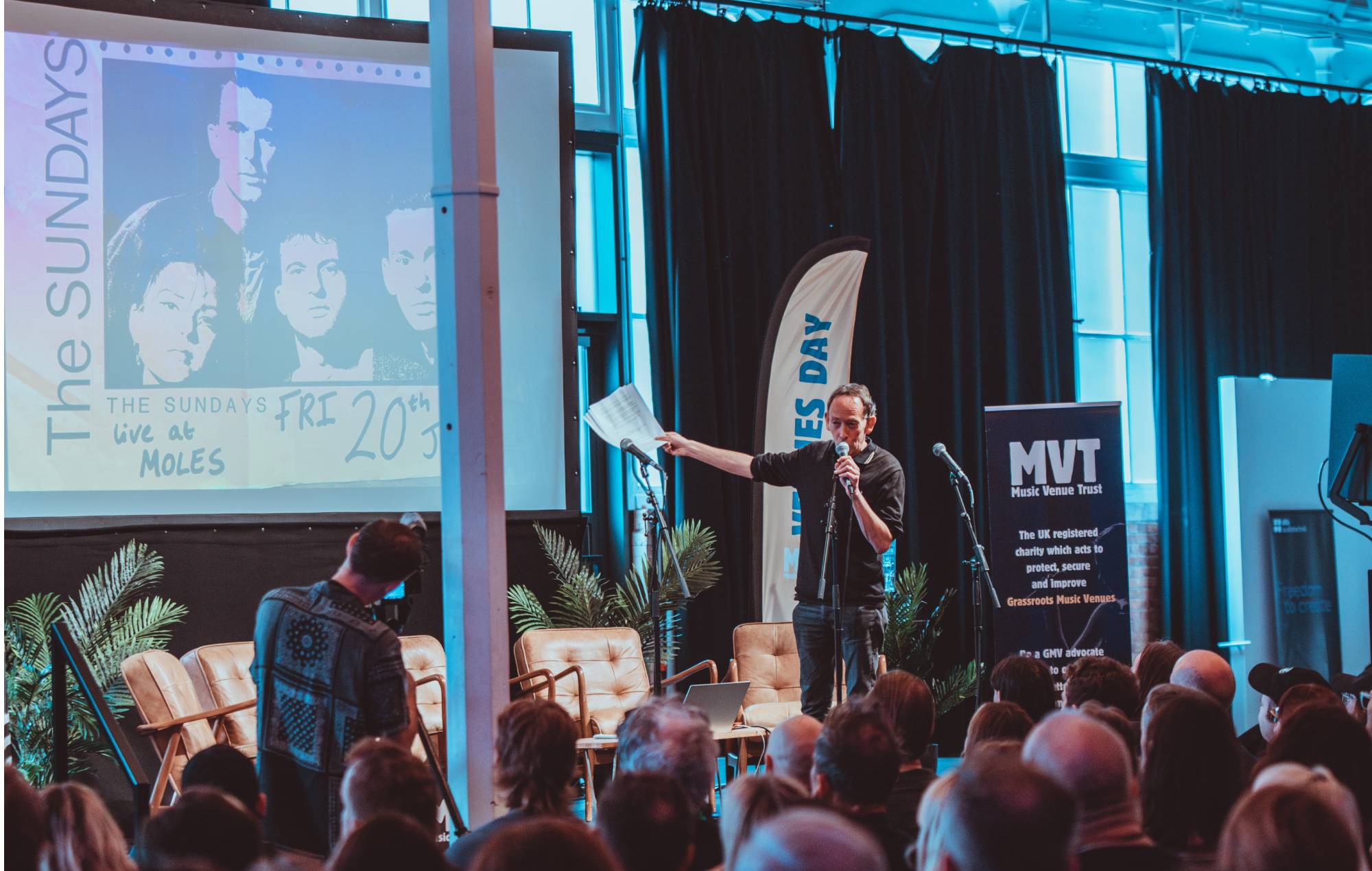The touring circuit across the UK’s grassroots music scene is said to be facing “complete collapse” without urgent help, in the wake of the recent budget news and the industry at large failing to respond.
This past year has seen pressure mounting for the UK’s smaller venues and rising artists to receive a contribution from arena and stadium gigs to ensure their survival. The model, similar to the one seen in the Premiere League of football and already in use in several countries across Europe, was recommended by MPs after a DCMS investigation back in Spring.
The likes of Coldplay, Enter Shikari and Sam Fender have all adopted a levy of their own on huge tours to help save the grassroots, but frustration remains around inactivity from the government and upper echelons of the industry – and the pressure is only mounting, with the call seeming to fall on deaf ears with the government following this week’s budget.
While 2023 proved to be “disastrous” and the worst year on record with 125 grassroots music venues shutting their doors, the MVT argue that a tidal wave of closures threatens the fabric of the UK music scene thanks to the recent budget announcement. They argue that £7million in new premises taxes will place over 350 grassroots music venues at immediate risk of closure – threatening more than 12,000 jobs, over £250million in economic activity and the loss of over 75,000 live music events.
“The challenges around business rates and grassroots music venues have been known and accepted for over a decade,” said MVT in a statement. “Changes in April 2026 are to be welcomed, but will be of no use for the hundreds of music venues that are now likely to be lost before this challenge is finally met with a full, long overdue reform.”
They’re now calling on music fans to urgently write to their MP here to stop the rise in Business Rates.
At the NME-supported Venues Day last month celebrating 10 years of the Music Venue Trust, the charity laid out the situation that the gig spaces across the UK face. Many are simply finding themselves “financially unviable”.
“This is an incredibly worrying trend that’s been going on for a long time that has now reached crisis point,” said MVT CEO Mark Davyd. “That trend is a complete collapse of touring.”
In 1994, the average length of a tour of grassroots venues around the UK was 22 shows with 28 locations on the primary and secondary circuit. After decades of decline – growing more steep in recent years – the average length of a UK tour is now around 11 shows with only 12 locations on the primary and secondary circuit.
“Bands cannot afford to pick up the cost of touring, venues cannot afford to turn the fucking lights on, agents are becoming incredibly averse to risk on behalf of their artists, managers are averse to risk as well, artists want to be out on the road and getting these audiences but this touring sector is as far as it can go without completely toppling over,” said MVT CEO Mark Davyd. “Something has to be done.”
He continued: “There are now 12 places on the primary and secondary touring circuit, and everyone else is absolutely scrambling for that one extra show that didn’t go to one of those places.”
Davyd spoke of how when a venue off the main touring route does manage to secure an an act to play, “they’re not the new and breaking acts that we want to support.”
Alongside the cost of living crisis having an impact on music fans attending gigs, Davyd said that “the reason shows aren’t happening is because venues cannot afford to put them on and artists cannot afford to play them.”
It was explained how grassroots venues were investing an “astonishing amount of money” from sales of food, alcohol, merchandise and more to subsidise the live music they put on due to a number of financial strains, including energy bills having increased by 440 per cent in recent years
“The subsidy of live music is now £161million – so you need to sell £161million of beer to pay for live music, and you’re doing that completely on your own,” argued Davyd. “No one at the top of the industry is saying to you, ‘This money is to help break a band’.”
He went on to argue for the £1 ticket levy for gigs at arena level and above, due to “the top of the sector” enjoying record-breaking profits while the around 43.8 per cent of the grassroots venues – acting as the “research and development centre” of the music industry” suffered a loss over the last 12 months.
“Why aren’t you closing?” Davyd asked the room of venue operators. “What’s the matter with you? I know why: there’s a hope bubble. You’re all hoping that what you’re doing is so important and must be recognised that they’re waiting for this change and for something to happen.”
Daniel Mawer, promoter at the Polar Bear in Hull, told NME how he felt “seen” by Davyd’s comments about hanging on out of hope.
“Polar Bear used to be owned by a national company who closed it during lockdown and we crowdfunded to bring it back, so everyone here’s either part-time or a volunteer and does it out of love,” said Mawer. “When we first came back, there was a resurgence of everyone wanting the nighttime economy to succeed and wanting to be back at gigs because they missed it. For a year and a half, we were genuinely packed. We’re still busy and have the busiest diary we’ve had, but the costs of everything have just risen so much. We can’t gamble as much as we’d like to.
“We’re clinging on to the hope that audiences will come back and that it will get easier for audiences to spend their income on going to see live music.”
Due to the relatively remote location of Hull, Mawer said that he felt like they were “at the end of the line”. “If you come to Hull, you’re not going anywhere – you come in and then take the same road out,” he admitted. “You have to make a very conscious decision to get to us, and that’s always been a stumbling block for us, but never more so than in this present climate.
“It’s always been a struggle to bring bands through, and even the Hull audience automatically decide that they’re going to have to go over to Leeds or Manchester. They’ve got used to it now, to the point where you do book an artist in Hull and the audience won’t realise that they can see them on their doorstep because they’re looking elsewhere.”
As a result, Mawer said that they do well out of offer free or low-entry nights to see artists at “the very beginning of their journey”, but that his venue were struggling to book the “mid-range emerging artists” that they aim to champion to local music fans. “It’s the buzzy industry artists breaking through that we struggle with, and it’s getting more and more prevalent,” he said. “We’re genuinely a lifeline in Hull for those who are brave enough to come out on a Tuesday night; they usually get rewarded.”
Arguing that venues such as the Polar Bear offer a hub of community and discovery – especially for young people – they should be assisted by the government and the upper echelons of the music industry.
“Business rates and VAT are very high,” Mawer explained. “If that wasn’t the case, we’d be able to gamble much more in putting on music and live events.”
He added: “Venues like ours don’t make money, but we are a platform for musicians at the very start of their careers. The football one is a great analogy. Grassroots venues should be seen as feeding the premiership, and we need to be protected.”
Brian Barnes from The Studio in Hartlepool agreed, claiming that music fans in more remote areas were being robbed more and more of access to live music.
“After COVID, being in a deprived North East town where money was already pretty scarce, we found that we were putting more gigs on, but they tend to be more tribute bands,” Barnes told NME. “We’re finding it difficult to get the original bands coming because they’re not touring.
“The bands who are on the up can only afford to tour the big cities – they don’t want the provincial towns. We’re finding it very difficult when talking to their agents.”
Barnes said that the most effective way to invest in grassroots music venues was the ticket levy, “because it feeds back into the ecosystem”.
“Venues would be able to afford to take the chance on putting on original music and the artists could afford to tour,” he argued. “At the moment, whatever money comes in goes straight out. We rely on funding for everything else. We don’t make enough money for repairs or to put the heating on. We need something to change.”
With a message to any and all music fans, Barnes pleaded: “Just come to gigs. Take a chance on that band you’ve never seen before – it helps them, and it helps us.”
The keynote speech at MVT’s Venues Day was given by radio DJ and journalist legend Steve Lamacq, who spoke passionately about his “fury” at the rate at which venues are closing due to their “transformative power”. “Every time this happens, we lose the opportunity for another magic and life-changing moment,” he argued, claiming that every gig that goes unplayed represents “30 minutes in the present that could have changed the future”.
He said that he had lost count of the live sets he’d witnessed over the last 30 years “where artists’ lives have changed during really special nights: nights that have given bands the momentum to go on to greater things, and in some cases, change the whole musical conversation.
“I’ve seen bands who have opened doors, changed tastes, and reinvigorated local scenes.”
Addressing the venue operators gathered in the room, he said: “You all have the ability to really change people’s lives. The audience will have memories of the gigs you put on long after you’ve probably forgotten about them yourselves. You and your hard work through the gigs you put on can help change the course of British pop music. It does. I’ve seen it.”
READ MORE: Music Venue Trust: “All hail Coldplay – then act to stop the collapse of live music”
He continued: “Coldplay, Radiohead, Oasis, Fontaines D.C., Elastica, Blur, Florence + The Machine, IDLES, Yard Act, English Teacher, The Sundays – if I had half an hour, I still wouldn’t be able to fit in all the bands who are on the list of groups that I’ve seen, who’ve helped change the course of music in this country.
“It’s not just about the past; what about the present? What about Fat Dog? What about Black Fondu? All of them have these things in common: they all need a place to learn, they all need someone to believe in them or take a punt on them, they all changed their destiny in the course of just 30 minutes.”
Hailing grassroots venues as “the biggest A&R department in Britain,” Lamacq ended by naming every grassroots gig space in the UK as the collective recipient of Music Venue Trust’s 2024 Outstanding Contribution Award.
Bev Whitrick, Steve Lamacq and Mark Davyd at Music Venues Trust’s Venues Day 2024, presenting the Outstanding Contribution Award. Credit: Georgia Penny
During the NME-chaired closing panel celebrating 10 years of the Music Venue Trust, MVT COO Beverley Whitrick said that a decade ago, “people didn’t think that grassroots venues were proper venues”.
“They didn’t think they were arts venues,” said Whitrick. “I wanted to be part of something that changed the view of what we now call grassroots music venues. “We’re still battling some people who still don’t get it.”
She added: “There is a lot more work to do, but I do feel that in 10 years we have come a long way. That does, in itself, suggest hope for further movement.”
Asked where she hoped the scene would be in another 10 years’ time, she replied: “I hope that grassroots music venues will be properly respected and recognised as the cultural venues and gems that they are. The ultimate dream is that MVT wouldn’t be needed because [all venues] would be secure. It would be lovely if the arguments we’re having didn’t need to be had because we’d won them.”
Davyd agreed: “Charities should aim to be dinosaurs; there should be a point in the future where you’re extinct.”
“You can’t build flats next to a music venue unless you protect the music venue. What’s wrong with that as a concept? What if we did all this naturally? What if, naturally, you weren’t allowed to shut down music venues? What if, naturally, when you succeed, everyone shares in that success? Naturally, bands can go on tour, and the venues will be open.”
Bev Whitrick, Mark Davyd, journalist Laura Kelly and NME’s Andrew Trendell at the closing panel of Music Venues Trust’s Venues Day 2024. Credit: Georgia Penny
He went on to commend the coverage provided by NME and the support shown by its readers for helping to “change the conversation around these grassroots music venues” by putting them “front and centre with the message, ‘You don’t know what you’ve got until it’s gone’.”
After a period in which live music overall saw the best year ever for ticket sales income with the largest number of arena, stadium and major festival events in history and record income and profits for the largest companies, the call for the industry itself to adopt a ticket levy before the government may be pushed to step in and enforce one only grows.
As well as urgent action on business rates and VAT, the MVT has also called for the promised report on the grassroots contribution, which was originally due for completion by September.
Meanwhile, if the government doesn’t act on advice to restore rate relief or set up an emergency fund for venues, then tickets could likely see an unsustainable increase at a grassroots level in order “to stop a complete collapse of live music in our communities”.
Write to your MP here to call for the cancellation of the rise in Business Rates for music venues.
The post UK grassroots venues suffering from “the complete collapse of touring” – here’s how you can help appeared first on NME.




